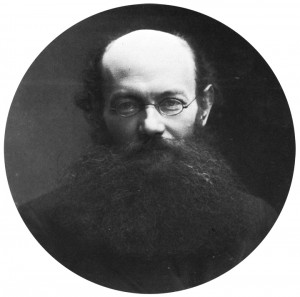The Lyon Anarchist Trial of 1883
 On this day in 1883, the trial of over sixty anarchists began in Lyon, France. The state rounded them up and charged them with reconstructing the French branch of the International Working Men’s Association, which had been outlawed the year before (in the aftermath of the Paris Commune). For their part, the accused used the opportunity to further spread their ideas. The trial, as Kropotkin later put it in his Memoirs of a Revolutionist, “during which all the accused took a very firm attitude, preaching our doctrines for a fortnight — had a powerful influence in clearing away false ideas about anarchism in France, and surely contributed to some extent to the revival of socialism in other countries… The contest between the accusers and ourselves was won by us, in the public opinion.”
On this day in 1883, the trial of over sixty anarchists began in Lyon, France. The state rounded them up and charged them with reconstructing the French branch of the International Working Men’s Association, which had been outlawed the year before (in the aftermath of the Paris Commune). For their part, the accused used the opportunity to further spread their ideas. The trial, as Kropotkin later put it in his Memoirs of a Revolutionist, “during which all the accused took a very firm attitude, preaching our doctrines for a fortnight — had a powerful influence in clearing away false ideas about anarchism in France, and surely contributed to some extent to the revival of socialism in other countries… The contest between the accusers and ourselves was won by us, in the public opinion.”
Below is the declaration the anarchists made in their defense. You can find it, excerpts from Kropotkin’s own defense speech, and about 650 additional pages of Kropotkin’s words in our book Direct Struggle Against Capital: A Peter Kropotkin Anthology, edited by Iain McKay
—
DEFENCE DECLARATION
What anarchism is, and what anarchists are, we shall try to explain: Anarchists, gentlemen, are citizens who, in an age when freedom of opinion is preached everywhere, have believed it to be their duty to call for unlimited freedom.
Yes, gentlemen, we are some thousand, some millions of workers, all over the world, who demand absolute freedom, nothing but freedom, the whole of freedom!
We want freedom—that is to say, we claim for every human being the right and the means to do whatever he pleases and only what he pleases, and to satisfy all his needs without any limit other than natural impossibilities and the needs of his neighbours, to be respected equally.
We want freedom, and we believe its existence to be incompatible with the existence of any kind of authority, whatever its origin and form may be, whether it is elected or imposed, monarchist or republican, whether it is inspired by divine right or by popular right, by holy oil [1] or by universal suffrage.
History is there to teach us that all governments are alike and equal. The best are the worst. There is more cynicism in some, more hypocrisy in others. In the end there is always the same behaviour, always the same intolerance. Even the most apparently liberal have in reserve, beneath the dust of legislative files, some nice little law on the International for use against troublesome opponents.
The evil, in other words, in the eyes of anarchists does not lie in one form of government rather than another. It lies in the governmental idea itself, it lies in the principle of authority.
In short, the substitution in human relationships of a free contract which can be revised or cancelled in perpetuity, for administrative and legal tutelage, for imposed discipline—that is our ideal.
Anarchists therefore intend to teach the people to do without government, just as they are beginning to learn to do without God.
The people will similarly learn to do without property owners. The worst of tyrants, after all, is not the one who imprisons you but the one who starves you, not the one who holds on to your collar but the one who tightens up your belt.
There can be no liberty without equality. There is no liberty in a society where capital is monopolised in the hands of a minority which is growing smaller every day, and where nothing is shared equally—not even public education, although it is paid for by the contributions of all.
We believe that capital—the common inheritance of mankind, since it is the fruit of the co-operation of past and present generations—must be at the disposal of all in such a way that none may be excluded, and that in turn no one may get possession of a part to the detriment of the rest.
In a word, we want equality—real equality, as a corollary or rather as a prior condition of liberty. From each according to his abilities, to each according to his needs—that is what we sincerely and strenuously desire. That is what will come about, for no regulation can prevail against claims which are at the same time legitimate and necessary. That is why you want to condemn us to all kinds of hardship.
Scoundrels that we are, we demand bread for everyone, work for everyone, and for everyone independence and justice too!
———
1 Literally, the Holy Ampule (Sainte-Ampoule). This was a glass vial which held the anointing oil for the coronation of the kings of France. Its first recorded use was by Pope Innocent II for the anointing of Louis VII in 1131. (Editor)
